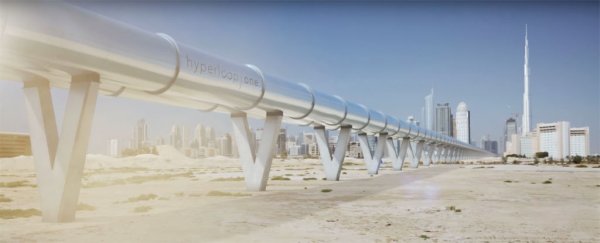A US startup pursuing Elon Musk's futuristic vision of insanely fast pod-based transport announced this week that it intends to build the world's first Hyperloop system in the United Arab Emirates (UAE).
The 159-kilometre (99 miles) route between the cities of Dubai and Abu Dhabi usually takes about 2 hours by car, but according to engineers at Hyperloop One, a Hyperloop pod could get you there in just 12 minutes – reaching a top speed of 1,220 km/h (760 mph).
The system, which Hyperloop One says could be ready as early as 2020, has a number of hurdles to overcome before it becomes a reality. The Hyperloop technology, which is still being tested in the US, isn't quite proven yet, and there's a lot of groundwork to be done in the UAE before construction can begin.
To get things started, Hyperloop One signed an agreement with Dubai's Roads and Transport Authority (RTA) on Tuesday to explore the issues surrounding the construction of this high-speed pipeline.
This feasibility study, which will take place will over the next 12 weeks, will involve designers, architects, and transport consultants – all examining where and how a Hyperloop could be built to join up Dubai and Abu Dhabi.
While it's obviously early days for the project, we've still got a pretty good idea of what a Hyperloop transport system might look like, thanks to the flashy concept video Hyperloop One unveiled this week:
As you can see, if the startup can pull this off, travelling huge distances via Hyperloop could become a casual, breezy experience.
Passengers would reserve a Hyperloop pod online as easily as ordering an Uber, and seat themselves in a self-driving, cube-like freight car called a Hyperpod.
These Hyperpods give you a range of options depending on your needs, such as lounge, meeting, and coach seating configurations.
The pods transport passengers to the Hyperloop portal, and once there, join up in clusters of four, before entering transporter capsules.
These transporter capsules would then enter the Hyperloop pipe, travelling at speeds of up to 1,220 km/h, thanks to a combination of levitation and low pressure in the pipeline.
The capsules that travel through the Hyperloop tube are powered by electromagnetic motors, and float on a cushion of pressurised air. It's not a total vacuum inside the pipe, but the deliberately maintained low pressure means air resistance is almost non-existent, which allows the capsules to travel at such high speeds.
And once the journey is over, the Hyperpod doesn't just dump you at the Hyperloop terminus. Instead, the researchers are hoping they'll be able to travel alongside other vehicles on public roads to get you to where you need to go – although the logistical nightmare of getting this approved is making our heads spin.
Yep, it's a pretty fantastic vision, and it would be amazing to experience, but this kind of utopian personal transport doesn't come cheap.
Leaked Hyperloop One documents obtained by Forbes last month showed that the estimated cost of the Dubai and Abu Dhabi Hyperloop amount to a stunning $4.8 billion in total (more than $30 million per kilometre, or $52 million per mile).
Given the company has so far only raised a fraction of that ($160 million), it will need a lot more investment to help turn this amazing concept into a reality.
And it's these financial hurdles that might ultimately be harder to get over than any difficulties in terms of the science of Hyperloop.
"I don't know if Hyperloop actually makes sense economically," transportation researcher Gil Tal from the University of California, Davis, told Megan Geuss at Ars Technica. "I think probably technological barriers are not that hard to overcome."
Likening the Hyperloop to the failed supersonic passenger jet Concorde, Tal says blisteringly fast transport doesn't always work if the service comes at too much of a premium.
"Yes we can fly from London to New York in 4 hours, but it makes no economical sense," he said. "Even though some people would be happy to pay five times or 10 times for a flight, it's just not enough."
It's too early to tell if that sober prediction applies here with the Hyperloop, but one thing's for sure: we can't wait to see how the next stages in the UAE turn out.
Because if Hyperloop One can successfully build the world's first commercial Hyperloop system, it would represent a whole new era in ground-based personal transportation, and that's something to get excited about.
We'll be watching.
